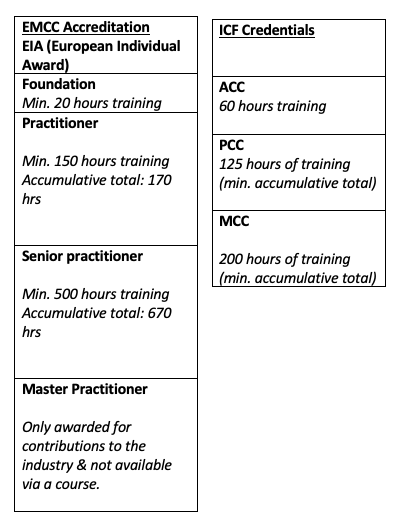One of the most frequent areas of confusion is the around Accreditation (or Credentialing for the ICF). All 3 main governing bodies have different requirements, processes and standards which continue to evolve as the coaching market does but for now, I am only focusing on the main 2 bodies our coaches are linked with – EMCC Global & the ICF.
This is a general post about accreditation / credentialing provided as an overview only.
If you are interested in the specifics of Team Coach Accreditation, please visit this post.
So in that context, here is my understanding of the current processes. Any mistakes or mis-understandings are entirely my own and feel free to write to me at [email protected] to suggest corrections, clarifications or updates. Links wherever possible are provided so you can find out the details for yourself and explore further.
Here at CCMI, we are unashamedly orientated towards the EMCC as David was one of the founders but we also are pragmatic by covering ICF credentialing too. We are an EMCC Global EQA holder (an accredited training provider) and as such, our programme names are aligned to the EMCC accreditation level names.
Let’s start with the basics:
Not all training programmes are appropriate or necessary to have a formal accreditation associated with it – especially where focused on up-skilling or empowering internal corporate staff who neither want or need to be accredited by a governing body.
But many of our programmes are for coaches, mentors, trainers, HR professionals, executives and team leaders and whilst anyone completing a CCMI programme is not obliged to join a professional body, it would be most unusual for a professional coach (internal or external) not to. Mostly because of the additional support you get to professionalise your business but also because clients are now increasingly aware and demanding of accreditation and professional memberships.
There are lots of nuances and detailed requirements but this deliberately simplistic perspective focuses just on the number of coach training hours required to achieve each level of certification as a Coach (individual or one-to-one coaching only):

Team Coaching accreditations are designed to be in addition to the individual awards – if you like another string to your bow. They would appear like this:

To illustrate that with some examples of common journeys:
It’s very common for an EMCC coach (just focusing on one to one or individual coaching) to go through a series of training programmes up to EMCC Senior Practitioner (EIA) before then adding Team Coaching training to their skill set. They could be both an individual coach at Senior Practitioner level (EIA) and a Team Coach at Foundation level (ITCA) until all levels of Team Coaching had been acquired – then they would be Senior Practitioner level for both Individual (EIA) & Team Coaching (ITCA).
It’s also entirely possible (but less common) to come into Team Coaching training with no experience or formal coaching qualifications (perhaps as a HR professional or even a team leader) and as you acquire your Team Coaching awards, be simultaneously awarded your Individual Coaching awards. For example, participants on our Team Coaching Foundation programmes are automatically awarded both an ITCA Foundation and an EIA Foundation level award. At the higher levels, additional criteria apply around coach or mentor experience but the principle is the same and there are no extra forms, tests or assignments to also receive an EIA.
Just for clarity, EMCC coaches can keep adding to this structure with Supervisor Accreditation (ESIA) and Coach/Mentor programme managers (IPMA) across the various accreditation levels.
ICF coaches can add the ACTC alongside their existing ACC, PCC or MCC credential provided they meet the various requirements necessary. It’s also possible to join the ICF and apply for the ACC and ACTC but you must apply for them separately, with ACTC following the ACC.
Renewing your Accreditation & Credentials:
EMCC accreditations are valid for 5 years & they will email you a reminder 6 months before they expire. Previously, renewal involved collating and evidencing a whole bunch of criteria (CPD hours, Supervision, client hours etc) but has evolved to be more streamlined and faster – you will be asked to confirm you have kept up with these things & will continue to do so after renewal.
ICF Coaches are required to renew their Credential every 3 years (a minimum of 40 hours of CCE’s at ACC, PCC & MCC plus Mentor Coaching & Supervision requirements as required) but many take the opportunity to upgrade their credential to the next level if they have enough accumulative training hours.
Copyright 2023 – Simon Clutterbuck
 Newsletter Signup
Newsletter Signup Sign Up For a Free Trial
Sign Up For a Free Trial